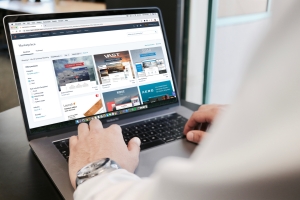Funnels and lead generation – does the salesy approach work?
Confused by funnels, landing pages and how that American style “salesy” stuff can work for your business?
Much of this is industry jargon, and chances are you’re already using a basic sales funnel to generate leads and customers for your business, regardless of what you do. Social media post linking back to your sales page is a good example, of this. But for the purpose of this blog I really want to delve into the nitty gritty of what these things are, and how using them the right way can really benefit your business.
A “funnel” is essentially your lead generation process
 How do you get your message across to as many people as possible, filter out those that don’t belong to your target audience and motivate the ones that do match your marketing avatar to become paying customers?
How do you get your message across to as many people as possible, filter out those that don’t belong to your target audience and motivate the ones that do match your marketing avatar to become paying customers?
Your funnel.
Just as the name implies it’s a filtering process that sorts the wheat from the chaff and results in the right leads, and eventually customers, for your business.
In fact, as this diagram from “Lead Generation: What Is Your Sales Funnel” by Dayna Rothman shows, it’s called a funnel as the process works much as the tool itself. With a wider encompassing section at the top to spread awareness and capture attention, that slowly slims down as it filters the wrong prospects out, and the process slims down into conversion and actual sales.
A simple way to think of a sales funnel is a basic social media marketing campaign.
You post on Facebook about your latest offer to raise awareness amongst your followers and to encourage interaction. Some of those people will click through to the sales/offer page, around 80% will decide this isn’t right for them and move on. The remaining 20% will find out more information and decide on whether or not to buy. You eventually end up with a few more paying customers than you had before.
A sales funnel doesn’t have to be difficult, or complicated.
It just has to be an identified process that you understand inside out that’ll work hard to attract and convert visitors into clients and customers. In that process you should be clear on how you capture leads, how you qualify them as being right for you, and how you nurture them into paying clients.
Where does the landing page fit in with funnels?
A landing page can be the page that your visitor “lands on” when they visit your website, but there’s another more specific type of page that we’re talking about when it comes to sales.
 In this case, the landing page is a standalone page that is separate from your main website and sales pages, in fact it rarely has a menu or links back to your website. That’s because a landing page is hyper focused on the call to action – it’s about making the strongest marketing case possible for your product or service to drive sales or sign-ups. It’s designed to be simple, effective and a critical part of your sales strategy.
In this case, the landing page is a standalone page that is separate from your main website and sales pages, in fact it rarely has a menu or links back to your website. That’s because a landing page is hyper focused on the call to action – it’s about making the strongest marketing case possible for your product or service to drive sales or sign-ups. It’s designed to be simple, effective and a critical part of your sales strategy.
There’s a strong school of thought online that a sales funnel must involve a landing page like this, but I don’t think it has to be essential. If you’re running a campaign to get more newsletter sign-ups then a landing page like this can work well if you’re offering a freebie, but most times a sample sales page can work just as well.
Do sales funnels actually work?
This is the question I’m asked more often than not, usually because people have seen an online digital marketing guru telling them that funnels are essential and you cannot build a business without one (they’re usually the ones that insist on standalone landing pages too).
I think that style of funnel can be effective, particularly if you have tangible products to sell. Driving clicks to the landing page that goes straight to a checkout is great for reaching a wide audience and driving sales.
But if you go back to basics and think of a sales funnel as I’ve described above, the process that you take from generating awareness through to conversion, then yes, they do work and are an important marketing tool for every business.
You should write down your “funnel”, and if you don’t think you have one for your business have a think about how you attract customers, how you let them know what you have to offer, how to weed out the ones that aren’t right for you, and how you encourage them to buy from you? If you’re not sure. then your marketing strategy might need some work to establish what your key processes are.
Lead generation and sales funnels can seem scary at first but they are something most of us as business owners do on a day-to-day basis without really thinking about it. If you need some help with your marketing strategy and how you can improve the sales funnels you use in your business, get in touch with me today.



Leave a Reply
Want to join the discussion?Feel free to contribute!